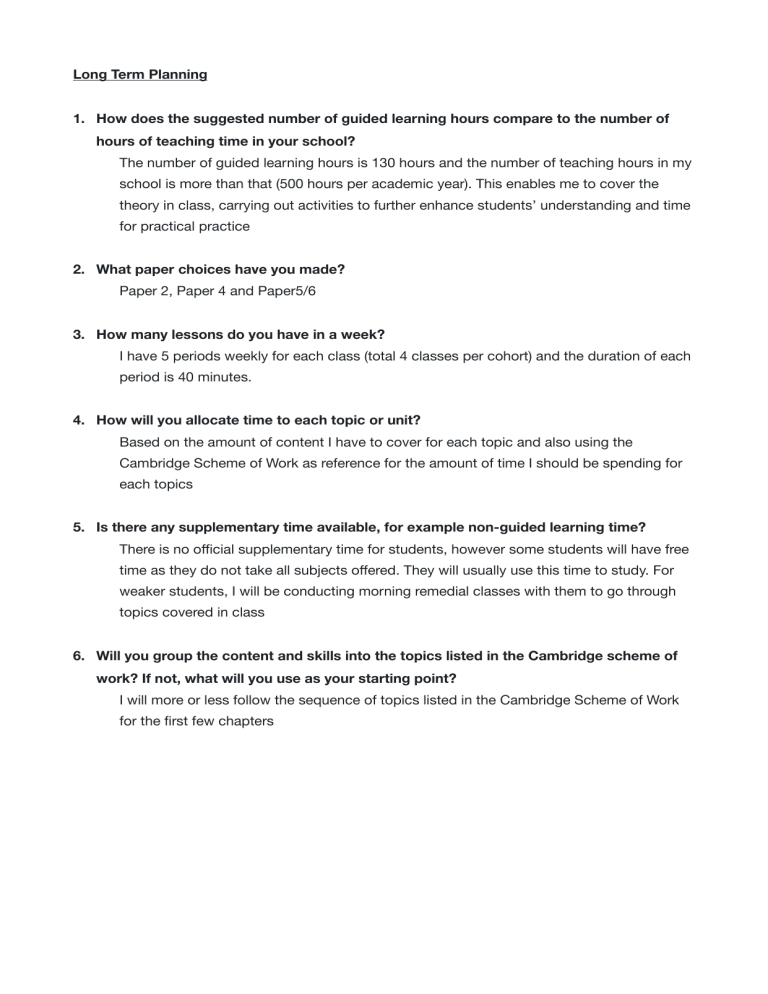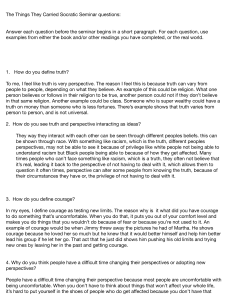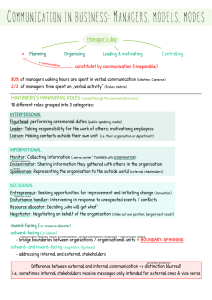
Long Term Planning 1. How does the suggested number of guided learning hours compare to the number of hours of teaching time in your school? The number of guided learning hours is 130 hours and the number of teaching hours in my school is more than that (500 hours per academic year). This enables me to cover the theory in class, carrying out activities to further enhance students’ understanding and time for practical practice 2. What paper choices have you made? Paper 2, Paper 4 and Paper5/6 3. How many lessons do you have in a week? I have 5 periods weekly for each class (total 4 classes per cohort) and the duration of each period is 40 minutes. 4. How will you allocate time to each topic or unit? Based on the amount of content I have to cover for each topic and also using the Cambridge Scheme of Work as reference for the amount of time I should be spending for each topics 5. Is there any supplementary time available, for example non-guided learning time? There is no o cial supplementary time for students, however some students will have free time as they do not take all subjects o ered. They will usually use this time to study. For weaker students, I will be conducting morning remedial classes with them to go through topics covered in class 6. Will you group the content and skills into the topics listed in the Cambridge scheme of work? If not, what will you use as your starting point? I will more or less follow the sequence of topics listed in the Cambridge Scheme of Work ff ffi fi for the rst few chapters 7. What order of teaching do you use? Do you follow the order of topics in a particular text book, or does your school use its own order for teaching? I change my order of teaching every year re ecting on the what went well and what do not went well with the sequence of topic the previous years. So far I am still experimenting with di erent arrangement of topics Sequence of topics that I am doing for this current cohort: a. States of matter (LO 1.1 - 1.2) b. Atoms, elements and compounds (LO 2.1 - 2.3) c. Periodic table (LO 8.1 - 8.5) d. Stoichiometry (LO 3.1) e. Atoms, elements and compounds (LO 2.4 - 2.7) f. Experimental techniques and chemical analysis (LO 12.1) g. Metals (LO 9.1 - 9.6) except Al extraction h. Stoichiometry (LO 3.2 - 3.3) i. Experimental techniques and chemical analysis (LO 12.3 - 12.5) j. Chemical Energetics (LO 5.1) k. Acids, bases and salts (LO 7.1) l. Experimental techniques and chemical analysis (LO 12.2) m. Acids, bases and salts (LO 7.2 - 7.3) n. Chemical reactions (LO 6.1 - 6.3) o. Chemistry of environment (LO 10.2) p. Chemical reactions (LO 6.4) q. Chemistry of environment (LO 10.1 & 10.3) r. Electrochemistry (LO 4.1 - 4.2) s. Metals (LO 9.6 - Al extraction) t. Organic chemistry (LO 11.1 - 11.8) 8. Which topics build upon knowledge and understanding developed in another topic in the list? Electrochemistry, chemical energetics, chemical reactions, acids, bases and salts, metals, chemistry of the environment, organic chemistry and experimental techniques and chemical analysis 9. Do your learners have one teacher responsible for delivering the whole course, or do two or more teachers teach di erent aspects of the course at the same time? What are the advantages and disadvantages of each approach? I will be the only teacher who will cover all di erent aspects (chemistry theory, practical, remedial and supplementary classes) of the course. The advantage of this is is that I can easily switch the topics around depending on many factors (national holidays, school ff fl ff ffi fi ff events, students nd it di cult to understand certain topic so more time need to be spend on that topic etc) without the need to consult another person. Disadvantage will be I need to be well-verse in all di erent aspect of the course. Having another teacher to co-teach with me will be good where each of us can focus on what we are good in and students will be able to get the most from us in di erent aspects of the course. Disadvantage from this is students may get confuse if 2 teachers have di erent ideas on the same concept. A lot of collaborative planning need to be carried out before we carry out each of ff ff ff our lessons to make sure that we are on the same page.





